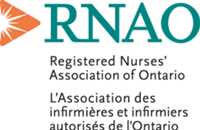Nurses say province's upcoming budget needs to invest in the health of Ontarians
BRAMPTON, ON, Jan. 18, 2017 /CNW/ - Representatives from the Registered Nurses' Association of Ontario (RNAO) say better wound care practices would save the government millions of dollars and stop hundreds of unnecessary amputations every year for people with diabetes.
That's one of 29 recommendations the association will present as part of a pre-budget submission in Brampton on Thursday when it appears before the Standing Committee on Finance and Economic Affairs. The committee is travelling around the province listening to advice before the government releases its spring budget.
RNAO says more than 2,000 people are forced to endure painful limb amputations and 800 people die prematurely every year simply because less-costly interventions are not publicly funded for people suffering from diabetic foot ulcers. Offloading devices, for example, relieve pressure from the ulcer and allow it to heal. But if left untreated, the ulcers can result in amputation.
"The human suffering experienced by these people is shameful and preventable," says RNAO's Chief Executive Officer (CEO) Doris Grinspun. "It is appalling that pressure relief devices, that cost anywhere between $100 and $1,500 per person, are not funded by government."
Figures from the Ontario Health Technology Advisory Committee (OTHAC) reveal the average cost of an amputation is about $74,000, and according to the Canada Diabetes Association (CDA), the direct cost of diabetic foot ulcers is about $400 million dollars. The CDA estimates that provincial funding of offloading devices could save the government between $48 and $75 million per year.
"The keys to solving many of our health problems are prevention and better health promotion, and that's why our government needs to immediately adopt a more upstream approach to its policy-making," says Grinspun. "Money we invest today will help us save even more down the road and prevent needless suffering."
Carol Timmings, RNAO's president, says the association's budget submission "lays out concrete examples of how we can take a smarter, and more responsible approach to our social and health expenditures and programs." For example, she says "investing one per cent of the province's budget to increase the number of affordable housing units and raising the minimum wage to $15 per hour will improve people's health for the better."
The association also has recommendations aimed at improving the efficiency of the health system by expanding the capacity of the province's 25 nurse practitioner-led clinics, 75 community health centres, 10 aboriginal health access centres, and 186 family health teams so more people can get faster access to services they need from an interprofessional team. RNAO also wants practice barriers removed so NPs can prescribe controlled substances and RNs can write prescriptions. "All these measures will immediately improve timely access to care and prevent higher costs due to needless complications," Timmings says.
Ontario must also stop the replacement of RNs with less-qualified health workers, Timmings says. "Hospitals that try to cut costs by replacing RNs with other health-care providers actually experience higher rates of complications and mortality, as well as more hospital re-admissions – all of which end up costing taxpayers more."
WHO: Veronique Boscart, RNAO board member and Kim Jarvi, RNAO's senior economist
WHAT: RNAO presents its budget recommendations to the Standing Committee on Finance and Economic Affairs
WHERE: Courtyard Marriott Hotel and Conference Centre (Windsor Room), 90 Biscayne Crescent, Brampton, Ont.
WHEN: 9:45 a.m. on Thursday, Jan. 19, 2017
Boscart and Jarvi will be available to speak to media following their presentation.
The Registered Nurses' Association of Ontario (RNAO) is the professional association representing registered nurses, nurse practitioners and nursing students in Ontario. Since 1925, RNAO has advocated for healthy public policy, promoted excellence in nursing practice, increased nurses' contribution to shaping the health-care system, and influenced decisions that affect nurses and the public they serve. For more information about RNAO, visit our website at RNAO.ca or follow us on Facebook and Twitter.
SOURCE Registered Nurses' Association of Ontario

For a copy of RNAO's budget submission or to arrange an interview with an RN, please contact: Marion Zych, Director of Communications, RNAO, Cell: 647-406-5605 / Office: 416-408-5605, Toll free: 1-800-268-7199 ext. 209, [email protected], www.RNAO.ca

Share this article